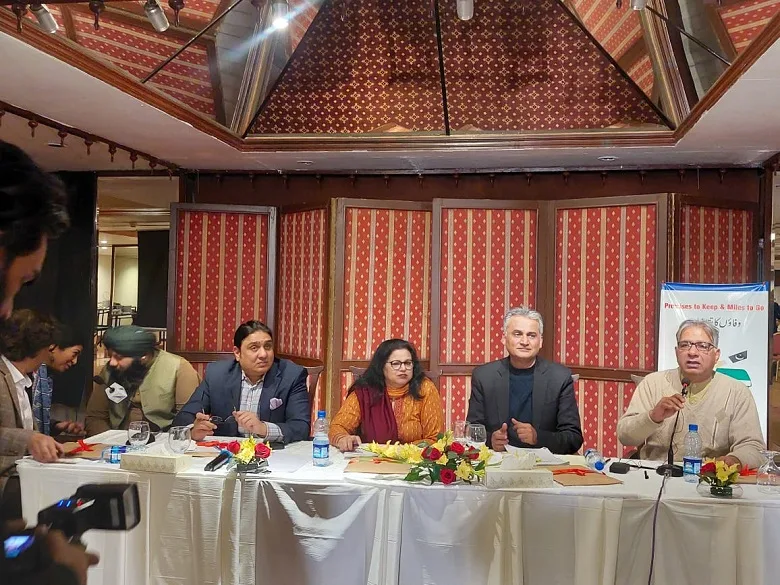LAHORE, Pakistan: The Centre for Social Justice (CSJ) organized a seminar on “political parties’ priorities and minorities’ rights” that emphasized the need to make meaningful pledges and develop concrete plans to implement equality of rights and freedoms.
The seminar was joined by representatives of political parties and civil society.
Peter Jacob, Tanveer Jahan, Saroop Ijaz, Irfan Mufti, and Ajmal Jami presented the way forward to address human rights issues while the representatives of political parties including Barrister Aamir Hassan (PPP) and Mahindar Paul (PTI) shared their respective party’s policy and actions towards the protection of minorities’ rights.
 The CSJ’s report titled “Promises to Keep & Miles to Go” based on the analysis of pledges, actions, and performance regarding minorities rights made by political parties was launched which revealed that none of the political parties was able to implement their pledges fully in the last three parliamentary tenures.
The CSJ’s report titled “Promises to Keep & Miles to Go” based on the analysis of pledges, actions, and performance regarding minorities rights made by political parties was launched which revealed that none of the political parties was able to implement their pledges fully in the last three parliamentary tenures.
The study found that Pakistan Tehreek-e-Insaf fulfilled none out of five promises made in election manifesto 2018, though it made partial progress on two promises.
Pakistan Muslim League-Nawaz (PML-N) failed to materialize nine out of ten promises. Pakistan Peoples Party (PPP) partially implemented one out of eight promises.
The study showed that one-third of the pledges in parties manifestos throughout three election years i.e. 2008, 2013, 2018 were common including; minority representation in ETPB, establishing a statutory minority commission, criminalizing forced conversions, reviewing curriculum, implementing job quotas and reviewing discriminatory laws. However, the pledges remain unfulfilled.
The study revealed that the Punjab government during 2008 and 2022 introduced 11 policy actions followed by the federal government with 9 actions, Balochistan with 8, Khyber Pakhtunkhwa with 7, and Sindh with 6 actions.
The majority of policy actions lacked a strong legal basis and implementation mechanism which indicates a need for a serious re-examination of our administrative system. The policy actions rely heavily on issuing notifications, which is a convenient use of administrative powers while the government evidently faced difficulties in legislating and instituting rules of procedures in various measures. The concrete information on the utilization of funds allocated for scholarship, places of worship, skill development etc. was not made public or there was a lack of implementation due to an absence of notifications or the purpose of the policy action was not fulfilled.
Peter Jacob, the Executive Director of CSJ, said that minorities rights is not a sectoral but a central issue of the politics of Pakistan. The onus is on the political parties to address human rights abuses and violations, particularly discrimination, intolerance, and extremism on the basis of religion but they failed to introduce progressive reforms dedicated to religious freedom and minorities rights, as evident in the case of draft bills on criminalizing forced conversions and setting up a national commission for minorities which were ignored by national, Punjab and Sindh assemblies due to pressure exerted by religious forces.
Peter Jacob urged political parties to build consensus for the conduct of a credible population census, and for reforms in election laws to ensure free, fair, and transparent general elections.
Barrister Amir Hassan said that the electorate should not support the politicians engaged in supporting or spreading religion based extremism. He demanded that the Objectives Resolution needs to be excluded and Jinnah’s August 11, 1947 speech should be added to the constitution of Pakistan.
Tanveer Jahan said that the political parties are all alike and they fall on the religious right of the spectrum. A regressive model is being projected to the people. Pakistan was made in the name of minorities then why have we forgotten the very reason of our existence.
Saroop Ijaz advocate said that the political parties need to focus on minorities issues in the national conversation and the political agenda for meaningful improvement in minority rights in Pakistan.
The CSJ’s report is timely, incisive and comprehensive analysis of the manifesto promises of political parties and to hold political leaders accountable for their responsibility of upholding tolerance and inclusion.
Irfan Mufti said that the state narrative borrowed from religio-political parties is manifested in policies of the political parties which reflects in the laws and the constitution. He added that, manifestos seem to be like a token or cosmetic. Political parties need to make concrete efforts to ensure the effective participation of women, minorities and other weaker sections of society in politics and democratic order. This will have positive effects on their politics and will broaden their political support in public.
Ajmal Jami said that the media groups need to engage minority legislators in regular discussions on political affairs rather than inviting them on minorities day or in case of incidents of violence against minorities. He demanded that, Political Parties need to do more to mainstream minorities, and job opportunities should be provided to journalists from minority communities.
Mahindar Paul said that Pakistan Tehreek-e-Insaf (PTI) is committed to taking legal, policy and administrative measures to safeguard minorities’ rights. Legislators need to make more efforts to effectively address the barriers and challenges faced by minorities, and they must introduce and support meaningful actions dedicated to the protection of minorities rights.
